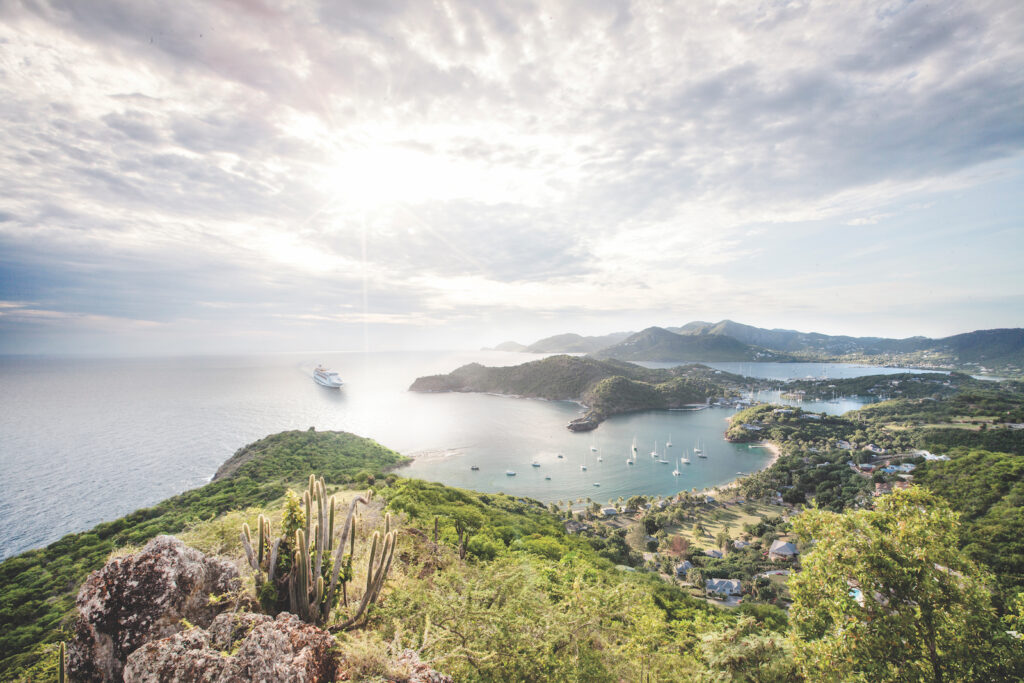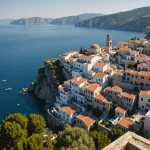by Dominic Volek, Group Head of Private Clients, Henley & Partners

At a time when the world is being disrupted by a crippling global pandemic, there are also many fascinating innovations. Unexpected surges in interest provoked by individuals feeling couped up and in need of change have taken many industries by surprise, not least the investment migration industry. One such unexpected byproduct of lockdowns and travel restrictions has been the interest that small and large island nations have been attracting as viable destinations to which high-net-worth individuals (HNWIs) and their families could escape should future crises necessitate relocation.
It is eerily prescient that in September 2019, just before the novel coronavirus began its journey of destruction around the world, a research paper entitled
‘The Prioritization of Island Nations as Refuges from Extreme Pandemics’ was published in the international journal Risk Analysis. The researchers considered 20 sovereign island states with populations of over 250,000 and ranked them as potential refuges for ensuring long-term human survival in the face of catastrophic pandemics. They found that the top five island nations most suitable for refuge status were Australia, followed closely by New Zealand, then Iceland, Malta, and Japan.
The research was conducted before the current pandemic and did not explore certain key contextual factors, including the islands’ capacity to rapidly close their borders when an emerging threat was first detected elsewhere. No doubt further investigations will be conducted now that the Great Lockdown has provided them with just such a reality.
Most island refuges host investment migration programmes
Whether they are large and highly developed or small and developing island nations, all have designed and implemented investment migration schemes for the same reasons – to attract foreign capital, skills, and knowledge to stimulate their domestic economies.
Large islands such as Australia and New Zealand host exceptionally desirable and successful residence-by-investment (RBI) programmes, while Malta offers an RBI programme and announced new Granting of Citizenship for Exceptional Services Regulations in November 2020. Neither Iceland nor Japan hosts formal investment migration programmes, but both offer investor visas that can lead to permanent residence.
Programme inflows boost revenues
While these five relatively large island nations are well resourced and have highly developed economies, many smaller islands are less so. Most are heavily dependent on tourism revenue that more or less dried up in 2020 – a potentially catastrophic situation. The major reason that many had implemented investment migration programmes over the past 14 years, was to aid economic recovery after devastating hurricanes by creating an alternative revenue stream.
Investment migration programmes create significant sovereign and societal value by delivering a source of sustainable liquidity that provides monetary and fiscal autonomy, as it is an equity injection – not increased leverage. This “sovereign equity”, as Henley & Partners has dubbed it, can be used to drive economic growth and core infrastructure development, enhancing the lives of all citizens. This immediate and debt-free mechanism for raising capital is much needed as nations grapple to recover from Covid-19.
In the years to come, the island nations that host RCBI programmes will rely even more on their capacity to generate sovereign equity in order to counteract the protracted tourism slump and other losses resulting from the pandemic.
Investors looking for safer alternatives
The unprecedented events of 2020 have prompted many people from all walks of life to reconsider how and where they want to live and explore alternative options in safer places where they feel secure, where the current pandemic has been relatively well managed, and where they are able to access good healthcare.
Many affluent business owners, investors, and their families who are in the fortunate position of being able to choose where they want to reside have realised that they can operate remotely and that there is no longer a need to be based in large financial city centers. Some have gone to the extreme of considering purchasing private islands and creating their own self-sufficient havens, and island brokers have been overwhelmed by enquiries in recent months.
However, while private islands may appear to be the perfect escape and owning one the ultimate status symbol, the logistics of purchasing and preparing them for being inhabited in comfort and style are tremendously complicated, particularly when travel restrictions are in place. Furthermore, a private island is not a stable long-term investment – in fact, they often become more of a liability than an asset.
Caribbean programmes offer attractive options
A far more straightforward solution for those seeking a quieter safer life in a destination with fewer people and cleaner air is the option of investing in the citizenship of Caribbean island nations such as St. Lucia, Antigua and Barbuda, or St. Kitts and Nevis. All three islands host highly attractive, established CBI programmes that encourage HNW families to relocate and contribute to the local economy through both entrepreneurial and consumer activity.
The relative smallness of the islands has enabled them to manage the current pandemic extremely well, and the number of cases of Covid-19 remains remarkably low; St. Kitts and Nevis had reported just 22 cases by late November, while Antigua and Barbuda had just 139 and St. Lucia 226.
St. Lucia was exceptionally well placed to deal with the fallout caused by Covid-19 due to the steady growth of its economy over the past four years. The island nation’s crisis management has also been exemplary – St. Lucia was able to isolate rapidly, which has increased investor confidence and applications to their Citizenship-by-Investment Programme remained steady throughout 2020.
Participating in any investment migration program is not only an investment in the future of your family, it is also a sustainable investment, as RCBI program inflows are relied on by their host nations to support progress. The island nation–investor relationship is mutually beneficial: whether they are large or small, many provide a safe and peaceful environment for affluent individuals seeking to futureproof their families, who in turn contribute to their chosen destination in terms of their capital, talent, and wealth.
Dominic Volek is Group Head of Private Clients at Henley & Partners and a member of the Executive Committee.
Originally from South Africa, he is a private client specialist in residence and citizenship planning and provides advice to ultra-high-net-worth individuals and their families across the globe. Dom’s work targets countries that are deemed most attractive to wealthy clients in terms of mobility, security, privacy, personal tax, estate planning, and lifestyle. He is also a member of the firm’s Government Advisory practice, providing strategic advice to governments on the design, implementation, and promotion of successful investment migration programmes.

Several Caribbean island nations were particularly innovative during the
Great Lockdown. The three new offerings below were all introduced between May and July, St. Lucia’s Covid-19 Relief Bond option has been extended until 31 December 2021, and St. Kitts and Nevis’s limited time offer for families applying under the discounted Sustainable Growth Fund (SGF) option is valid until 15 January 2021.
St. Lucia – Top choice for business and family
St. Lucia innovated during the lockdown by introducing a Covid-19 Relief Bond option that runs until 31 December 2021, whereby one can invest a minimum of US$250,000 in a non–interest-bearing government bond that is held for five years to qualify for citizenship. The number of years rises according to the number of dependents (maximum of four). If there are more than four additional dependents, the investment amount rises to US$300,000 to be held for five years, which is attractive to investors with large families.
St. Lucia does not have a residence or visitation requirement for applicants, which makes it particularly appealing in the current time when mobility is restricted. Furthermore, a spouse, dependent children under 31, dependent siblings under 18, and dependent parents aged 55 and over can be included in the application, making it an excellent family relocation mechanism.
The island’s high-speed broadband network, direct flights to the US and London, favourable legislation, and visa-free access to 146 destinations worldwide at a competitive investment level have all helped make the St. Lucia Citizenship-by-Investment Programme attractive to international investors as well as companies looking to move their headquarters to the Caribbean.
Antigua and Barbuda – Excellent tertiary education option
Another novel Caribbean option that is tailored for large families is Antigua and Barbuda’s University of West Indies (UWI) Fund option. It is only applicable for families of six or more and will entitle one family member to a one-year scholarship at the UWI. The inflows for this option will be used to finance UWI’s fourth campus, demonstrating the dual island nation’s commitment to education and developing home-grown talent.
Established in 1948, UWI is the largest and longest standing higher education provider in the English-speaking Caribbean and as part of its globalisation agenda it has established partnering centers with universities in Africa, Asia, Europe, Latin and North America. Alumni include renowned business leaders, innovators, heads of state, Rhodes Scholars, and Nobel Laureates.
Advantages of citizenship of Antigua and Barbuda include visa-free or visa-on-arrival travel to 151 destinations including Europe’s Schengen Area, and a spouse, dependent children under 29, dependent parents and grandparents
aged 58 and over can be included in the application.
St. Kitts and Nevis – Invest in growth
St. Kitts and Nevis has introduced a time-limited option to make a non-refundable contribution of US$150,000 (for up to four persons) to the SGF, which is valid until 15 January 2021. After this, the SGF requirement will revert to US$195,000 (for up to four persons).
The SGF represents the ongoing development of the dual island nation and funds are used to advance the economy to the benefit of all citizens. Citizens of St. Kitts and Nevis enjoy visa-free or visa-on-arrival travel to 156 destinations, and citizenship-by-descent is available for future generations. A spouse, dependent children under 31, dependent parents and grandparents aged 55 and over can be included in the application.






